Tag Archive: research
January 14, 2014
by Carole Zangari -
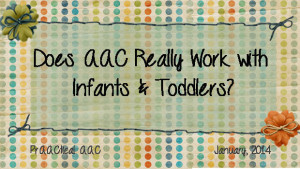
We are occasionally asked how old children have to be before you can begin teaching AAC. Our answer: There is no set minimum age. Nor is there any research evidence that one has to use an oral-language only approach for a set period of time before beginning AAC. Today, we’re delighted to be able to share an article on this topic with you. This article describes a research review in which Branson and Demchak identified a dozen research studies looking specifically at the use of various AAC tools and strategies with infants and toddlers. Data from 190 children up to 36 months of age were examined. Of the 12 studies reviewed, 7 met criteria for having conclusive findings. In 97% of all cases, the children’s communication skills improved. Looking only at the 7 most rigorous studies is even more encouraging: All 135 babies/toddlers demonstrated improved communication skills following AAC intervention.... [Read More...]
Filed under: PrAACtical Thinking
Tagged With: infants, research, toddlers, young children
June 25, 2013
by Robin Parker -
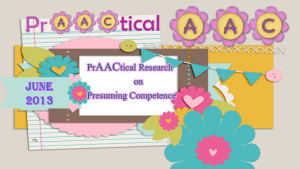
We love PrAACtical research that involves intervention that presumes competence. In this post, we bring you an article by Drs. Anne Emerson and Jackie Dearden on how adopting a ‘full’ language approach and presuming competence can result in increased understanding of complex language and literacy skills. (Emerson & Dearden, 2013). They discuss the role of adopting a ‘minimal’ vs ‘full’ language teaching approach. Checkout the Sage Journals online abstract here: The effect of using ‘full’ language when working with a child with autism: Adopting the ‘least dangerous assumption’ Emerson, A., & Dearden, J. (2013). The effect of using ‘full’ language when working with a child with autism: Adoptingthe ‘least dangerous assumption. Child Language Teaching & Therapy, 29(2), 233-244. doi: 10.1177/0265659012463370
Filed under: PrAACtical Thinking
Tagged With: presume competence, research
June 24, 2013
by Carole Zangari -

When people have significant communication difficulties that severely restrict their participation in daily life experiences, professionals and families alike sometimes find themselves attracted to the use of unproven methods. Although this usually comes from a good place, (i.e., the fervent desire to help someone), we have to be very careful in facing these decisions. Like you, we’ve heard comments like “Let’s try it. What’s the harm?” and they scare us. The harm can be difficult to quantify but is real nonetheless. Just talk to Gracie, whose mom cancelled therapies one summer and used the monies to take her swim with the dolphins. We’re not dolphin-haters, but there’s not much they can do for apraxia. We thought it was a good time to revisit this tutorial on differentiating science from pseudoscience. Many thanks to Dr. Caroline Bowen for hosting this article on her terrific website, Speech Language Therapy.com. Finn, P., Bothe,A.,... [Read More...]
Filed under: PrAACtical Thinking
Tagged With: best practices, EBP, evidence, pseudoscience, research, science
June 17, 2013
by Carole Zangari -
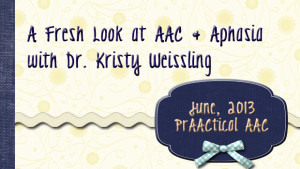
We’re so pleased to be able to share the thoughts of our friend and colleague, Dr. Kristy Weissling, on providing AAC supports to people with aphasia. She received her professional doctorate from Nova Southeastern University and is currently an Assistant Professor of Practice and clinical supervisor at the Barkley Speech-Language and Hearing Clinic at the University of Nebraska-Lincoln. Her research and teaching interests include, aphasia, cognitive communication impairments, and AAC. She participates in implementation of a portion of the RERC grant project at the University of Nebraska-Lincoln. She has been an instructor in aphasia and cognitive linguistic impairments for 15 years and teaches in both online and live formats. Her clinical load includes individual and group treatment of individuals with aphasia, traumatic brain injury, and early cognitive decline. In this post, Kristy reflects on three articles that have shaped her clinical services and teaching. :::::::::::::::::::::::::::::::::: I have been working with people who... [Read More...]
Filed under: PrAACtical Thinking
Tagged With: aphasia, EBP, Fresh Look, Kristy Weissling, research
June 11, 2013
by Carole Zangari -
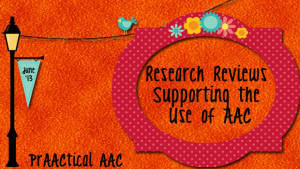
When recommending AAC, SLPs often find it useful to use research findings to support their clinical rationales. Sometimes we share articles with colleagues and families, or provide references in evaluation or consultation reports. In this post, we share a number of research reviews, studies which examined previously done research in AAC. Finding a relevant systematic is like hitting the jackpot, because the researchers have already done an exhaustive search of the literature on the topic, then analyzed the studies that met their criteria. Here are several research reviews that might come in handy during your AAC work. Ganz, J.B., Earles-Vollrath, T.L., Heath, A.K., Parker, R.I., Rispoli, M.J., & Duran, J.B. (2012). A meta-analysis of single case research studies on aided augmentative and alternative communication systems with individuals with autism spectrum disorders. Journal of Autism and Developmental Disorders, 42,1, 60-74. McCarthy, J., & Light, J. (2005). Attitudes toward individuals who use... [Read More...]
Filed under: PrAACtical Thinking
Tagged With: EBP, reference list, research, systematic review
February 20, 2013
by Carole Zangari -

It’s always exciting when we see new ideas take shape in AAC tools. Take a look at the research on VIVIVOCA: voice-input, voice-output communication aid. This holds much promise for clients who have poor speech intelligibility but good consistency in their error patterns, such as people with dysarthria secondary to cerebral palsy. Here’s the article. Thanks to the indefatigable Ian Bean for alerting us to this article. Hawley, M.S., Cunningham, S.P., Green, P.D., Enderby, P., Palmer, R., Sehgal, S., & O’Neill, P. (2013). A voice-input voice-output communication aid for people with severe speech impairment. IEEE Transactions on Neural Systems and Rehabilitation Engineering, 21, 1, 23-31.
Filed under: PrAACtical Thinking
Tagged With: article, journal article, research, SGD, speech recognition
February 1, 2013
by Carole Zangari -
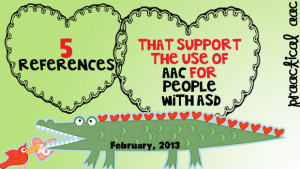
We occasionally get asked to provide empirical supports for some of the AAC tools and strategies used in our clinical work and teaching. Here are five references that we wanted to pass along. Ganz, J.B., Earles-Vollrath, T.L., Heath, A.K., Parker, R.I., Rispoli, M.J., & Duran, J.B. (2012). A meta-analysis of single case research studies on aided augmentative and alternative communication systems with individuals with autism spectrum disorders. Journal of Autism and Developmental Disorders, 42,1, 60-74. Systematic review of 24 single subject experimental design (SSED) studies investigated the impact of AAC interventions and concluded that aided AAC interventions had positive effects on communication and behavior skills. Although all picture-based AAC systems were effective, learners did best with SGDs or PECs. Checkley, R., Reidy, L., Chantler, S. Hodge, N., & Holmes, K. (2012). “Black white zebra orange orange”: How children with autism make use of computer-based voice output communication aids in their language... [Read More...]
Filed under: PrAACtical Thinking
Tagged With: ASD, references, research
October 26, 2012
by Carole Zangari -
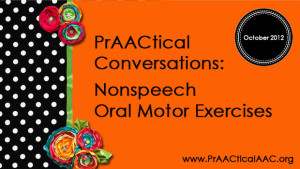
There are some good reasons to use nonspeech oral motor exercises, like blowing, puckering, tongue lateralization, and stretching. For a period of time, I used resistance exercises extensively with one client to improve the resting posture of his articulators and help him keep his mouth closed. Good for hygiene and to reduce his exposure to germs. Using these strategies, lots of children have gained strength and control that allowed them to better bite, chew, and swallow their food. Oral motor exercises can result in some meaningful gains. According to the research, however, improved speech articulation is not among them. There have been a number of studies on this approach, including some strong systematic reviews by McCauley and others. This summary by Dr. Greg Lof (Chair of the Department of Communication Sciences and Disorders at Massachusetts General Hospital Institute of Health Professions) is a few years old but is worth another... [Read More...]
Filed under: PrAACtical Thinking
Tagged With: controversy, EBP, evidence, nonspeech oral motor exercises, research, resources
May 18, 2012
by Carole Zangari -
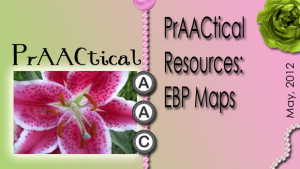
– –ASHA’s Center on Evidence-Based Practice (EBP) in Communication Disordersis beginning to have some relevant information for the AAC community. While many SLPs equate EBP with research and journal articles, this is only one component. ASHA’s EPB group is working with content area specialists to develop navigable evidence ‘maps’ to highlight information in each of the three pillars of EBP: Clinical Expertise/Expert Opinion, Research, and Client/Family Perspectives. – Professionals working with children and adults who have developmental disabilities may be interested in this Evidence Map on AAC and Cerebral Palsy. Additional evidence maps that have an AAC-related component been developed for dementia, TBI in adults, and autism.
Filed under: PrAACtical Thinking
Tagged With: client perspective, clinical expertise, EBP, research
April 22, 2012
by Carole Zangari -
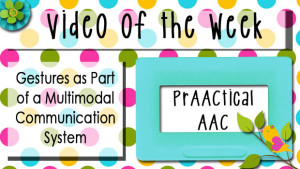
Gesture Recognition in Aphasia Therapy (GeST) is a project that emphasizes the use of gestures to help individuals with aphasia communicate effectively. GeST is a computer-based program to teach simple gestures and provide home practice opportunities. Project leaders used a participatory design to gain the input from 5 people with aphasia in developing the program. They are currently evaluating its effectiveness in a pilot study. We are big fans of multimodal communication and love the prAACtical applications of this program. You can check it out for yourself at this video.
Filed under: Video of the Week
Tagged With: aphasia, computer, Multimodal, research









